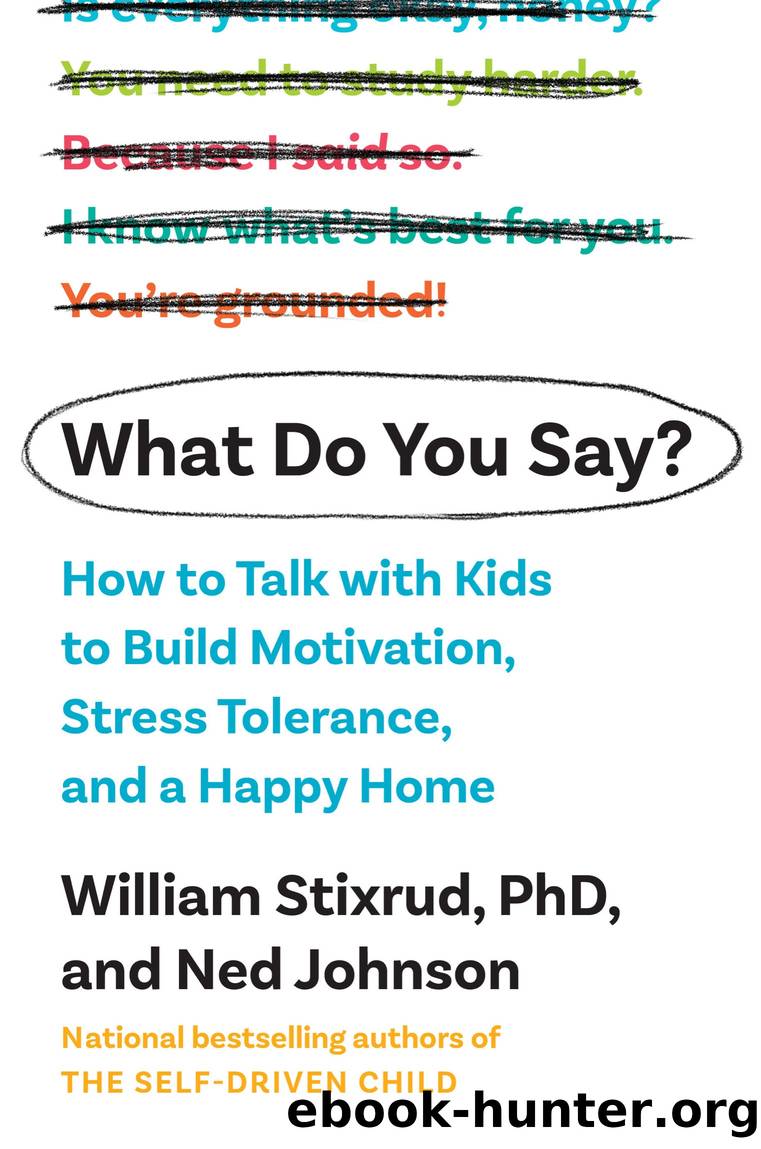What Do You Say? by William Stixrud PhD & Ned Johnson

Author:William Stixrud, PhD & Ned Johnson [Stixrud, William & Johnson, Ned]
Language: eng
Format: epub
Publisher: Penguin Publishing Group
Published: 2021-08-17T00:00:00+00:00
Modeling Expectations
William H. Jeynes, who has studied parental expectations for decades, says that the healthiest expectations donât come via edicts nor are they voiced as demands like, âYouâd better make the cross-country team next year, because youâre going to need it for college applications!â Healthy expectations are more often unspoken and communicated by modeling a strong work ethic, a strong faith in the future, and âa pleasantly steadfast spirit.â10
One of the best ways parents can communicate the healthy kind of expectations is by verbalizing how they walk the line between healthy and toxic themselves. Reminisce, tell stories of expectations your own parents had (or still have!) of you, and how you dealt with them. Or perhaps you share a goal youâve set for yourself, something thatâs important to you, and how you are pushing yourself to meet that goal. If you model a commitment to service or to helping family members or friends when they are in need, you are showing your kids the expectations you have for how you want to show up in the world.
Mastermind groupsâa group of people who share goals, problem-solve, and hold one another accountableâare already popular with business groups and entrepreneurs.11 They work for families, too. Families can meet each week to share goals theyâve set for themselves around their health, or school, or work. Even if your familyâs group lasts for only a few months, itâs okayâeven a little bit helps kids see that the entire family is goal-directed, and supportive of one another setting their own goals.
If you make a mistake, telling your kids about it, and asking for their advice, normalizes mistakes and guards against perfectionism. Practice using positive self-talk when youâre speaking about yourself or other people. âIâve got a presentation today,â you might say; âIâm pretty well prepared, so I think it should go well.â Or âI can do the work necessary to learn this piece on the piano.â
Download
This site does not store any files on its server. We only index and link to content provided by other sites. Please contact the content providers to delete copyright contents if any and email us, we'll remove relevant links or contents immediately.
Spare by Prince Harry The Duke of Sussex(5173)
Navigation and Map Reading by K Andrew(5147)
Tuesdays with Morrie by Mitch Albom(4763)
Machine Learning at Scale with H2O by Gregory Keys | David Whiting(4289)
Cracking the GRE Premium Edition with 6 Practice Tests, 2015 (Graduate School Test Preparation) by Princeton Review(4270)
Never by Ken Follett(3930)
Goodbye Paradise(3795)
What It Really Takes to Get Into Ivy League and Other Highly Selective Colleges by Hughes Chuck(3741)
Fairy Tale by Stephen King(3365)
Harry Potter and the Prisoner of Azkaban (Book 3) by J. K. Rowling(3346)
Pledged by Alexandra Robbins(3169)
Kick Ass in College: Highest Rated "How to Study in College" Book | 77 Ninja Study Skills Tips and Career Strategies | Motivational for College Students: A Guerrilla Guide to College Success by Fox Gunnar(3113)
Reminders of Him: A Novel by Colleen Hoover(3070)
A Dictionary of Sociology by Unknown(3069)
Sapiens and Homo Deus by Yuval Noah Harari(3058)
The Social Psychology of Inequality by Unknown(3013)
Graduate Admissions Essays, Fourth Edition: Write Your Way into the Graduate School of Your Choice (Graduate Admissions Essays: Write Your Way Into the) by Asher Donald(2905)
Will by Will Smith(2901)
Zero to Make by David Lang(2775)
